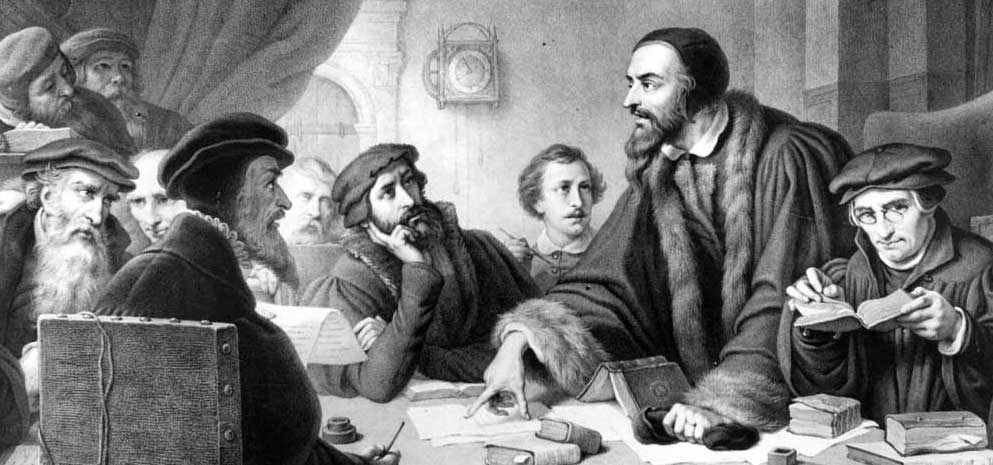
by Bret Capranica | Jul 19, 2015 | Biblical Studies, Christian Living, Pastoral Ministry, Preaching
John Calvin, the sixteenth century pastor-theologian in Geneva, known most often for his theological treatise, The Institutes for the Christian Religion, should equally be remembered for his commentaries on almost every book of the Bible. As I finish an overview of the book of Psalms at my church, consider how Calvin introduced his commentary on this penetrating part of Scripture: The wearied and resplendid riches which are contained it this treasury it is no easy matter to express in words; so much so, that I well know that whatever I shall be able to say will be far from approaching the excellence of the subject. But as it is better to give to my readers some taste, however small, of the wonderful advantages they will derive from the study of this book, than to be entirely silent on the point, I may be permitted briefly to advert to a matter, the greatness of which does not admit of being fully unfolded. I have been accustomed to call this book, I think not inappropriately, “An Anatomy of all the Parts of the Soul;” for there is not an emotion of which any one can be conscious that is not here represented as in a mirror. Or rather, the Holy Spirit has here drawn to the life all the griefs, sorrows, fears, doubts, hopes, cares, perplexities, in short, all the distracting emotions with which the minds of men are wont to be agitated. The other parts of Scripture contain the commandments which God enjoined his servants to announce to us. But here the prophets themselves, seeing they are exhibited to...

by Bret Capranica | Mar 12, 2014 | Pastoral Ministry
Here are a few more quotes from Manetsch’s book Calvin and His Company of Pastors Regarding Spiritual Counsel and Consolation “Words fail to explain how necessary prayer is. . . . Surely with good reason the Heavenly Father affirms that the only stronghold of safety is in calling upon his name.” Through prayer, Christians are reminded of God’s providential care for them, experience God’s power to heal and help them, and receive assurance of God’s grace to forgive their sins and bring them into eternal life. In sum, Calvin believed, “it is by prayer that we call [God] to reveal himself as wholly present to us.” 290. Goulart’s ten principles to be followed by Christian pastors, or “consolers,” as they apply the medicine of Scripture to the needs of suffering men and women: The pastor should know and have true compassion for the person suffering. The pastor should encourage the ailing Christian to adore the judgment of God and be mindful of his mercy. The pastor should conduct a careful examination of the conscience of the suffering person, probing its condition, deportments, and passions, so as to apply the proper kind of spiritual consolation. The pastor should have at hand a variety of examples of faithful Christians who faced similar afflictions and yet trusted in the grace of God. The pastor should remind the afflicted Christian that other believers have remained faithful as they faced similar, or even worse, trials. The pastor should listen to and affirm what the suffering person says, while gently expanding upon or correcting opinions that are confused or inaccurate. The pastor should encourage the ailing...

by Bret Capranica | Mar 5, 2014 | Pastoral Ministry
Here are a few more notable quotes from Scott M. Manetsch’s book, Calvin’s Company of Pastors: Pastoral Care and the Emerging Reformed Church, 1536-1609. On Church Discipline Calvin insisted that the power of the keys did not give the church the authority to pronounce damnation or salvation – that decision belonged to God alone. Instead, the church’s discipline was always provisional, intended to rescue the wayward in a spirit of mildness and gentleness. In this way, Calvin averred, reformed excommunication was to be distinguished from the Catholic pronouncement of anathema, for whereas the latter “condemns and consigns a man to eternal destruction,” the former warns the sinner of future condemnation and “calls him back to salvation 188-189. Calvin, Beza, and their colleagues believed that ministers exercised the power of the keys in three primary ways. First, the spiritual authority to ‘bind and loose’ was exercised in a general way when ministers preached the gospel in their sermons, announcing God’s righteous judgment upon the wicked and God’s promise of salvation to those who turned to Christ in repentance and faith. Second, the power of the keys was employed more particularly when pastors and lay elders conducted annual household visitations to examine the character and doctrine of church members, or when they admonished sinners in private conferences. Finally, ministers and elders employed the power of the keys through the ministry of the Consistory as they confronted people who were guilty of moral failure and excommunicated from the Lord’s Table those who refused to repent of their error. . . . The power of the keys needed to be exercised with wisdom...

by Bret Capranica | Feb 26, 2014 | Personal
Last week I listed a number of quotations from Scott M Manetsch’s book, Calvin’s Company of Pastors on ministry and life during and just after John Calvin’s life. Here are a few more on the subject of how preaching was practiced and received in Geneva during the era of the Reformation: The Ministry of the Word …the pulpit stood at the epicenter of controversy and change in reformed Geneva. In the minds of Geneva’s ministers, the proclamation of the Scripture was God’s dynamic instrument for bringing about personal spiritual regeneration, the reformation of the church, and the transformation of society according to the righteousness of Christ. 146 Preaching in Calvin’s Geneva What was noteworthy . . . was not that Protestant leaders like Luther, Zwingli, or Calvin championed Christian preaching per se, but that they viewed the proclamation of the Word of God as the minister’s primary duty and restructured parish life in view of this priority. 148 The Ecclesiastical Ordinances (1541) envisioned that a pastoral staff of five men and three assistants would preach at least twenty sermons in the city each week. 148 The preacher was not the proprietor of a pulpit or the captain of his congregation: it was Christ who presided over his church through the Word. At least in theory, ministers of the Christian gospel were interchangeable. 150 For most of his career in Geneva, Calvin preached once or twice on Sundays, and every day of the week on alternate weeks, a schedule that demanded around eighteen to twenty sermons per month, or two hundred fifty sermons per year. In all, Calvin probably...

by Bret Capranica | Feb 19, 2014 | Calvinism, Pastoral Ministry
A friend recently recommended I read Scott M. Manetsch’s book, Calvin’s Company of Pastors: Pastoral Care and the Emerging Reformed Church, 1536-1609. How grateful I am for the suggestion. It is a fascinating look into the spiritual life of Geneva during and after Calvin’s public ministry there. Here are a few thoughts from a portion of the book. From the time of John Calvin’s coming to Geneva until the beginning of the seventeenth century, more than 130 pastors participated in what was referred to as Geneva’s Venerable Company of Pastors. These shepherds sought to oversee not only the ongoing work of the Reformation, but the practical shepherding of the churches in and around the city of Geneva. The following are quotes from the book that I have found interesting as to how these shepherds sought to oversee the flock of God among them. So much is the same, little has changed. Regarding one of the final meetings John Calvin had with his colleagues in ministry: . . . he exhorted his pastoral colleagues to be on guard against all religious innovation in the future. “I beg you also to change nothing and to avoid innovation,” Calvin stated, “not because I am ambitious to preserve my own work. . . but because all changes are dangerous, and sometimes even harmful.” 1 On establishing and maintaining right worship: Calvin identified two principal qualities of authentic Christian worship: it is spiritual and it is dependent upon the divine Word. Worship is “spiritual” in that it originates in the ministry of the Holy Spirit who initiates faith in the Christian man or woman and...












